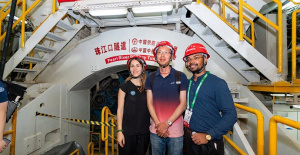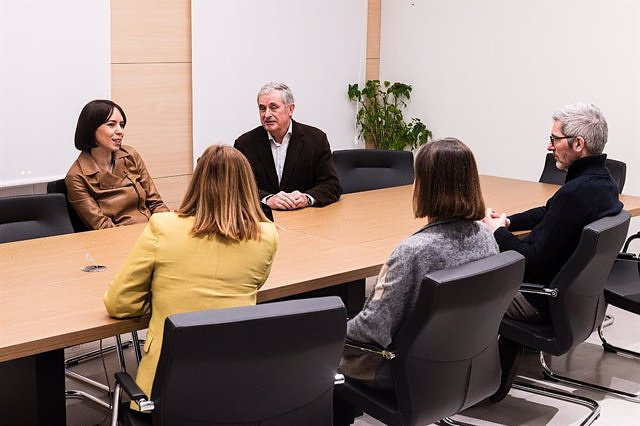VALENCIA, 1 Feb. (EUROPA PRESS) -
The Minister of Science, Innovation and Universities, Diana Morant, has announced that the facilities of the Institute of Corpuscular Physics (IFIC), a joint center of the Higher Council for Scientific Research (CSIC) and the University of Valencia (UV), in the Scientific Park of the UV in Paterna (Valencia), will house a linear accelerator-injector for carbon ions, scientific equipment "unique in Spain" to fight cancer.
Morant, who visited the House of Science this Thursday, detailed that the new facility, which has a budget of 18 million euros through the Center for Technological Development and Innovation (CDTI), within the framework of the European Regional Development Funds (ERDF 2021-27), will allow the development of "very advanced" research and therapy programs.
Morant has vindicated the "unprecedented commitment" of the Government of Spain to people's health through science. "We work to improve research and the design of health solutions in order to offer well-being and hope to citizens," she proclaimed, according to the Ministry in a statement.
Specifically, the proposal to be installed at the IFIC involves the development of a linear accelerator-injector for carbon ions (C6) with an energy of at least 10 megaelectronvolts per nucleon (MeV/n), as the first stage of a complete installation of carbon ions. At an operational level, this equipment will be the basis of a facility that will operate at the IFIC for scientific exploitation in preclinical biomedicine and radiobiology.
The compact linear ion accelerator is a technique that is emerging as one of the "most effective" future therapies in radiological treatments against cancer. Protons (particles that form the nucleus of the atom) and ions (electrically charged atoms) allow the irradiation on tumor tissues to be modulated with "great precision", with "much less" damage to healthy tissue than conventional radiotherapy that uses photons (X-rays), as detailed by the Ministry.
Treatment with protons or ions is "especially recommended" for pediatric cases and radio-resistant tumors. In addition, ions have "greater" radiobiological efficacy, "even less" toxicity and a "more favorable" immunological response than protons. However, the Ministry points out that "more studies" are required to confirm these results.
Ion beam technology is now "sufficiently mature" and the "real challenge" is the generalization of its accessibility, since currently they are "singular, rare worldwide, large and expensive" equipment.
Hence, the department led by Morant emphasizes the need for an innovation process that "simplifies" the instrumentation of the equipment and, in addition, makes possible the reconversion of hospital spaces that are currently used to facilitate "greater expansion" of this therapy and its application in those patients who need it.
In any case, the Ministry has highlighted that the scientific use of this equipment will make radiobiological studies "unique worldwide" possible. In this regard, he detailed that the range of possibilities for research that opens up with this facility is "very wide", such as modeling and systematizing the behavior of ions, the study of new dose deposition techniques, studying the possible combined use of different ions, complementarity to be able to apply variable radiation energies and the comparison of effects depending on the type of ions, among others.
These lines of research aim to contribute in clinical and preclinical aspects to develop "more precise and specialized" planning of treatments with protons, ions and new techniques, in coordination with similar facilities in Europe and Japan.
The facility has been built through a Public Procurement of Innovation (PPI) process, a tool to promote innovation from the public sector through the acquisition of innovative solutions or solutions in the development phase. In this case, the award has been made to AVS GROUP (Added Value Industrial Engineering Solutions S.L.U), a "leading" company in the design and development of equipment for the space and high science sectors. The Center for Energy, Environmental and Technological Research (CIEMAT) also participates in the construction of the accelerator.

 Exploring Cardano: Inner Workings and Advantages of this Cryptocurrency
Exploring Cardano: Inner Workings and Advantages of this Cryptocurrency Seville.- Economy.- Innova.- STSA inaugurates its new painting and sealing hangar in San Pablo, for 18 million
Seville.- Economy.- Innova.- STSA inaugurates its new painting and sealing hangar in San Pablo, for 18 million Innova.- More than 300 volunteers join the Andalucía Compromiso Digital network in one month to facilitate access to ICT
Innova.- More than 300 volunteers join the Andalucía Compromiso Digital network in one month to facilitate access to ICT Innova.-AMP.- Ayesa acquires 51% of Sadiel, which will create new technological engineering products and expand markets
Innova.-AMP.- Ayesa acquires 51% of Sadiel, which will create new technological engineering products and expand markets Abascal (Vox) criticizes that Sánchez is "victimizing" himself and calls for elections after his possible resignation
Abascal (Vox) criticizes that Sánchez is "victimizing" himself and calls for elections after his possible resignation Carlos Alcaraz reaches the round of 16 in Madrid without breaking a sweat
Carlos Alcaraz reaches the round of 16 in Madrid without breaking a sweat Some 5,000 people demonstrate in front of Congress for democracy, hours before Sánchez's decision
Some 5,000 people demonstrate in front of Congress for democracy, hours before Sánchez's decision STATEMENT: Intelligent systems used in the construction of the deepest underwater tunnel in China
STATEMENT: Intelligent systems used in the construction of the deepest underwater tunnel in China How Blockchain in being used to shape the future
How Blockchain in being used to shape the future Not just BTC and ETH: Here Are Some More Interesting Coins Worth Focusing on
Not just BTC and ETH: Here Are Some More Interesting Coins Worth Focusing on UPV students build a prototype of a wooden house to move to Equatorial Guinea
UPV students build a prototype of a wooden house to move to Equatorial Guinea The UA opens the call for the Impulso 2024 Awards for the best innovative business initiatives
The UA opens the call for the Impulso 2024 Awards for the best innovative business initiatives ALI, virtual assistant from Alicante, internationally recognized by the OECD
ALI, virtual assistant from Alicante, internationally recognized by the OECD Retrópolis brings the golden age of video games and computing to the UPV
Retrópolis brings the golden age of video games and computing to the UPV A million people demonstrate in France against Macron's pension reform
A million people demonstrate in France against Macron's pension reform Russia launches several missiles against "critical infrastructure" in the city of Zaporizhia
Russia launches several missiles against "critical infrastructure" in the city of Zaporizhia A "procession" remembers the dead of the Calabria shipwreck as bodies continue to wash up on the shore
A "procession" remembers the dead of the Calabria shipwreck as bodies continue to wash up on the shore Prison sentences handed down for three prominent Hong Kong pro-democracy activists
Prison sentences handed down for three prominent Hong Kong pro-democracy activists ETH continues to leave trading platforms, Ethereum balance on exchanges lowest in 3 years
ETH continues to leave trading platforms, Ethereum balance on exchanges lowest in 3 years Investors invest $450 million in Consensys, Ethereum incubator now valued at $7 billion
Investors invest $450 million in Consensys, Ethereum incubator now valued at $7 billion Alchemy Integrates Ethereum L2 Product Starknet to Enhance Web3 Scalability at a Price 100x Lower Than L1 Fees
Alchemy Integrates Ethereum L2 Product Starknet to Enhance Web3 Scalability at a Price 100x Lower Than L1 Fees Mining Report: Bitcoin's Electricity Consumption Declines by 25% in Q1 2022
Mining Report: Bitcoin's Electricity Consumption Declines by 25% in Q1 2022 Oil-to-Bitcoin Mining Firm Crusoe Energy Systems Raised $505 Million
Oil-to-Bitcoin Mining Firm Crusoe Energy Systems Raised $505 Million Microbt reveals the latest Bitcoin mining rigs -- Machines produce up to 126 TH/s with custom 5nm chip design
Microbt reveals the latest Bitcoin mining rigs -- Machines produce up to 126 TH/s with custom 5nm chip design Bitcoin's Mining Difficulty Hits a Lifetime High, With More Than 90% of BTC Supply Issued
Bitcoin's Mining Difficulty Hits a Lifetime High, With More Than 90% of BTC Supply Issued The Biggest Movers are Near, EOS, and RUNE during Friday's Selloff
The Biggest Movers are Near, EOS, and RUNE during Friday's Selloff Global Markets Spooked by a Hawkish Fed and Covid, Stocks and Crypto Gain After Musk Buys Twitter
Global Markets Spooked by a Hawkish Fed and Covid, Stocks and Crypto Gain After Musk Buys Twitter Bitso to offset carbon emissions from the Trading Platform's ERC20, ETH, and BTC Transactions
Bitso to offset carbon emissions from the Trading Platform's ERC20, ETH, and BTC Transactions Draftkings Announces 2022 College Hoops NFT Selection for March Madness
Draftkings Announces 2022 College Hoops NFT Selection for March Madness























